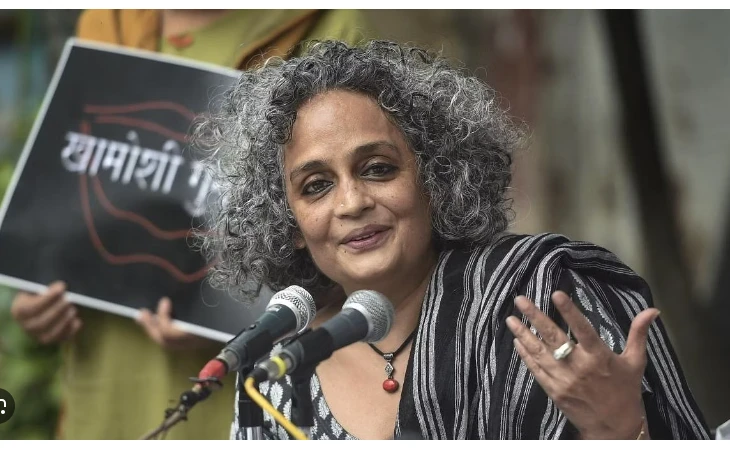Famous Indian writer Arundhati Roy faces anti-terror prosecution over Kashmir remarks

Stay tuned with 24 News HD Android App

World-famous award-winning Indian author Arundhati Roy could soon face trial under India’s contested “anti-terror” laws in a case that has drawn outrage from free speech advocates in India and beyond.
An official from Prime Minister Narendra Modi’s far-right ruling Bharatiya Janata Party gave the go-ahead for Roy’s prosecution over comments she made about Kashmir in 2010.
This comes as Modi was sworn during last week to his third term as prime minister after the BJP won the most seats in Indian Parliament, but lost its outright majority.
“This case is so convoluted, it’s hard to say where it begins and where it ends — and that’s the point. The process is the punishment,” says Indian author and journalist Siddhartha Deb, who teaches at The New School in New York. Deb says Modi is trying to show that “everything is normal” despite the shocking electoral setback, with the case against Roy being used to placate his “rabid attack dogs of Hindu nationalism.”
Indian authorities have also sanctioned the prosecution of former Central University of Kashmir professor Sheikh Showkat Hussain. Both will be prosecuted under the Unlawful Activities Prevention Act (UAPA) for making provocative speeches.
Arundhati Roy, who is perhaps best-known for her 1997 novel The God of Small Things that won the Booker Prize in the same year, is being prosecuted over remarks that she made at a panel discussion in 2010 over Kashmir, in which she suggests the region was not an ‘integral’ part of India. A criminal complaint accusing her of sedition was filed shortly after the event. The case had largely languished for more than a decade until last October, when VK Saxena, a top official in the Delhi administration, dug it up and gave approval for it to be legally examined.
Writing of Kashmir in her 2020 book Azadi, whose title derives from the Urdu word for ‘freedom’ that is chanted by those opposing the Indian rule of Kashmir, Roy points out that the region is ‘where only fiction can be true because the truth cannot be told’.
The permissions to prosecute Roy and Hussain could lead to their immediate arrest.
Last week, 14 years after the original complaint, Delhi's most senior official granted permission for the Booker Prize-winning author Arundhati Roy to be prosecuted under India’s stringent anti-terror laws. The Unlawful Activities (Prevention) Act (UAPA) is notorious for making it exceptionally challenging to get bail, often resulting in years of detention until the completion of trial.
The Modi government has been accused of using the law to silence critics. including activists, journalists and civil society members.
Ms Roy, 62, an outspoken writer and activist, is in the dock for comments on Kashmir, a perennial lightning rod in India.
“Kashmir has never been an integral part of India. It is a historical fact. Even the Indian government has accepted this,” she said at a stormy, day-long conference in Delhi, organised by the Committee for the Release of Political Prisoners, in October 2010.
At the time, Indian-occupied Kashmir was in turmoil, with locals describing it as a fierce uprising against India.
Ms Roy's remarks had followed the deaths of dozens of protesters since fresh pro-freedom demonstrations broke out earlier that year.
Ms Roy’s remarks predictably set off a firestorm of protest, with many critics questioning her loyalty to India, and the federal government, then led by the Congress party, threatening to arrest her on charges of sedition. A senior minister said while India enjoyed freedom of speech, "it can't violate the patriotic sentiments of the people".
There were protests outside Ms Roy's home in an upscale Delhi neighbourhood. A criminal complaint was lodged against her and Sheikh Showkat Hussain accusing them and two others of sedition.
Ms Roy defended her right to free speech soon after the controversy. "In the papers some have accused me of giving 'hate-speeches', of wanting India to break up. On the contrary, what I say comes from love and pride," she wrote in a response. "It comes from not wanting people to be killed, raped, imprisoned or have their finger-nails pulled out in order to force them to say they are Indians... Pity the nation that has to silence its writers for speaking their minds."
Lawyers are puzzled by the decision to prosecute Ms Roy more than a decade after her speech. She was originally accused of sedition, but the Supreme Court suspended the colonial-era sedition law in May 2022; invoking UAPA charges allows the state to bypass the statute of limitations and proceed with the case.
Ms Roy has been a trenchant critic of Mr Modi's government, which rights groups accuse of targeting activists and muzzling free speech. The permission for her prosecution comes just after Mr Modi's re-election for a third term.
Many view this as a political signal that the BJP will continue its strong-arm tactics, even in coalition government.
Sushil Pandit, the main complainant from 2010, refused to speculate on the delay. "Those who sat on these files and decided to act now should explain. There must be an inquiry into why this was delayed, and accountability should follow," he told Times Now television.
Many view this as another attempt to silence Mr Modi's critics. Writer Amitav Ghosh wrote on X: "The hounding of Arundhati Roy is absolutely unconscionable. She is a great writer and has the right to her opinion. There should be an international outcry against prosecuting her for something she said a decade ago."
When Delhi authorities approved the case to proceed in court in October, Canadian writer and activist Naomi Klein warned Mr Modi on X: "You have no idea what you will unleash by pursuing this political prosecution to silence your most eloquent critic."–Agencies
